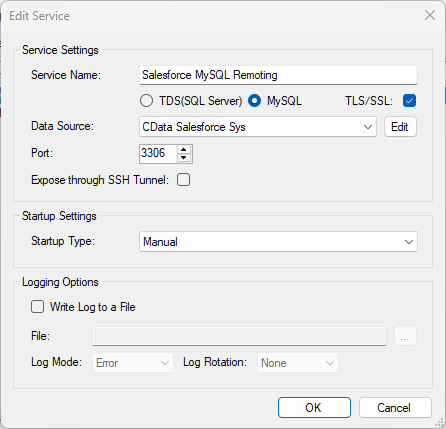Discover how a bimodal integration strategy can address the major data management challenges facing your organization today.
Get the Report →How to create Snowflake federated tables in MySQL
Use the SQL Gateway and the ODBC Driver to set up federated tables for Snowflake data in MySQL .
You can use the SQL Gateway to configure a MySQL remoting service and set up federated tables for Snowflake data. The service is a daemon process that provides a MySQL interface to the CData ODBC Driver for Snowflake: After you have started the service, you can create a server and tables using the FEDERATED Storage Engine in MySQL. You can then work with Snowflake data just as you would local MySQL tables.
Connect to Snowflake Data
If you have not already done so, provide values for the required connection properties in the data source name (DSN). You can use the built-in Microsoft ODBC Data Source Administrator to configure the DSN. This is also the last step of the driver installation. See the "Getting Started" chapter in the help documentation for a guide to using the Microsoft ODBC Data Source Administrator to create and configure a DSN.
To connect to Snowflake:
- Set User and Password to your Snowflake credentials and set the AuthScheme property to PASSWORD or OKTA.
- Set URL to the URL of the Snowflake instance (i.e.: https://myaccount.snowflakecomputing.com).
- Set Warehouse to the Snowflake warehouse.
- (Optional) Set Account to your Snowflake account if your URL does not conform to the format above.
- (Optional) Set Database and Schema to restrict the tables and views exposed.
See the Getting Started guide in the CData driver documentation for more information.
Configure the SQL Gateway
See the SQL Gateway Overview to set up connectivity to Snowflake data as a virtual MySQL database. You will configure a MySQL remoting service that listens for MySQL requests from clients. The service can be configured in the SQL Gateway UI.

Create a FEDERATED Server and Tables for Snowflake Data
After you have configured and started the service, create a FEDERATED server to simplify the process of creating FEDERATED tables:
Create a FEDERATED Server
The following statement will create a FEDERATED server based on the ODBC Driver for Snowflake. Note that the username and password of the FEDERATED server must match a user account you defined on the Users tab of the SQL Gateway.
CREATE SERVER fedSnowflake FOREIGN DATA WRAPPER mysql OPTIONS (USER 'sql_gateway_user', PASSWORD 'sql_gateway_passwd', HOST 'sql_gateway_host', PORT ####, DATABASE 'CData Snowflake Sys');
Create a FEDERATED Table
To create a FEDERATED table using our newly created server, use the CONNECTION keyword and pass the name of the FEDERATED server and the remote table (Products). Refer to the following template for the statement to create a FEDERATED table:
CREATE TABLE fed_products ( ..., id TYPE(LEN), productname TYPE(LEN), ..., ) ENGINE=FEDERATED DEFAULT CHARSET=latin1 CONNECTION='fedSnowflake/products';
NOTE: The table schema for the FEDERATED table must match the remote table schema exactly. You can always connect directly to the MySQL remoting service using any MySQL client and run a SHOW CREATE TABLE query to get the table schema.
Execute Queries
You can now execute queries to the Snowflake FEDERATED tables from any tool that can connect to MySQL, which is particularly useful if you need to JOIN data from a local table with data from Snowflake. Refer to the following example:
SELECT fed_products.id, local_table.custom_field FROM local_table JOIN fed_products ON local_table.foreign_id = fed_products.id;






